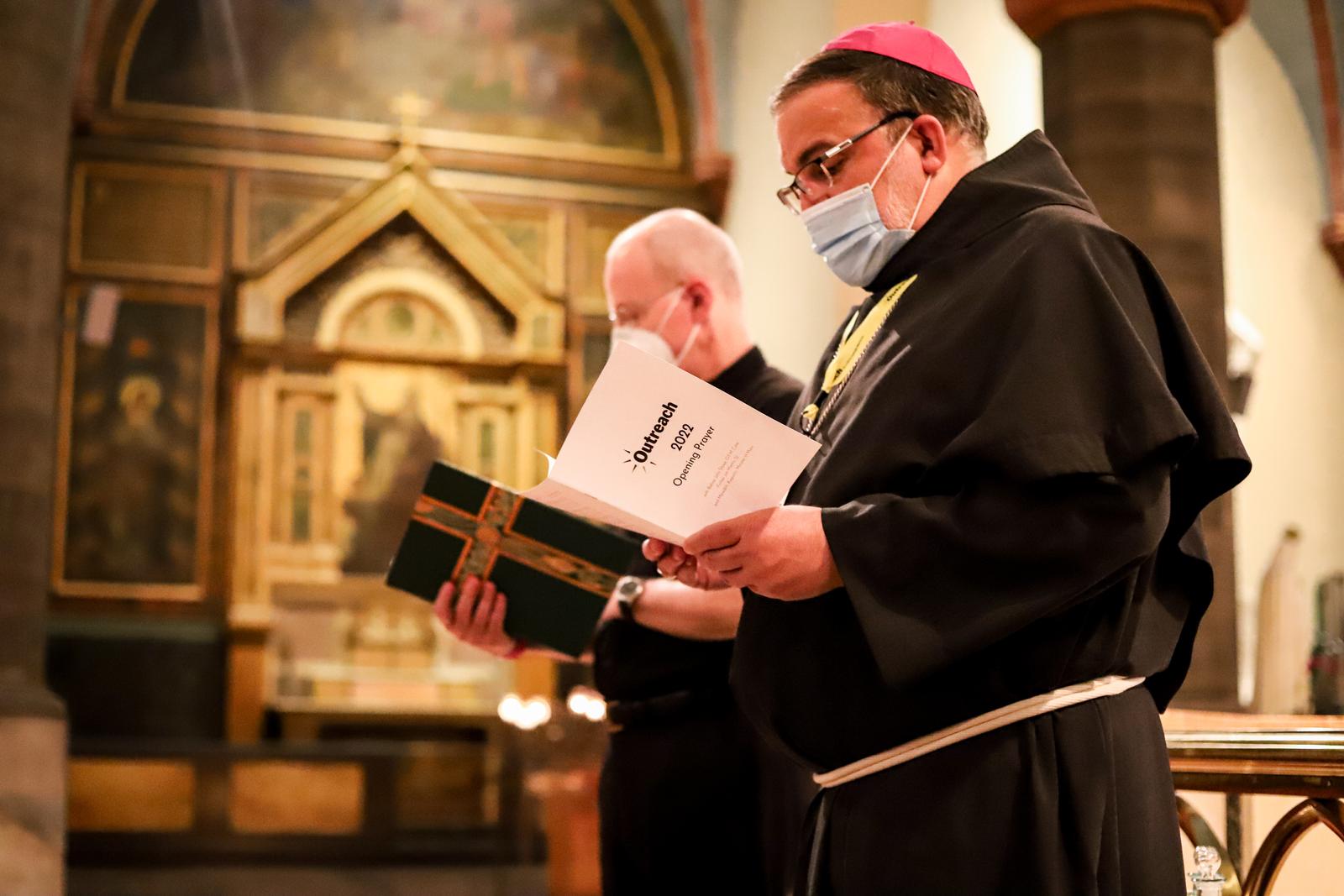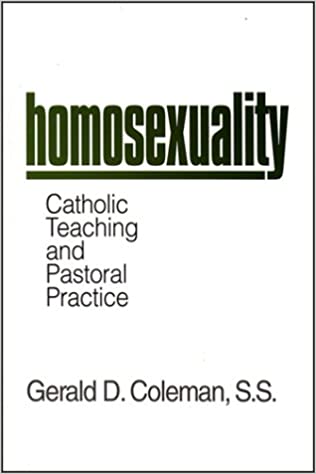This essay is the first part of an address delivery by Bishop Stowe, O.F.M. Conv., at the Outreach conference in New York City on June 24, 2022. This text has been edited for style and clarity. The first part of this speech is available here.
In one of the first instructions that God gives humanity in the written form of revelation, in the Book of Genesis, is that it is not good for man, for the human person, to be alone. Companionship, partnership, a sharing among equals, the sacrificial love of serving another before caring for one’s self are all good for human beings.
Traditional marriage is the way that need is fulfilled for Adam, according to Genesis, forming a partnership with one who is bone of his bone and flesh of his flesh that provides both companionship and the possibility of procreation. But since the church has always seen marriage as a vocation, a call, and not one for everyone, there are other ways of fulfilling that need for companionship and reciprocal love. Religious and priestly vocations, for centuries, have found that fulfillment in community and friendship.
Jesus, according to the witness of the gospels, was unmarried. The perfect revelation of the Father’s love in the flesh did not himself enter into marriage. He did not seek an exclusive relationship of love with another human person. We would call him “pro-marriage,” as we can see from the first sign that he performs in the context of a wedding, and the frequent references to weddings as an image of the kingdom of God.
He taught clearly about the permanence of the marital commitment. Although unmarried himself, Jesus did enter into loving friendships. Yes, of course, he loved everyone. But the gospels do not hide that Jesus loved some in a particular way. In the fourth gospel, which could very well be called the Gospel of love, the author is referred to simply as the Beloved Disciple.
Some scholars convincingly describe this unnamed disciple as a placeholder for each of us: we can all have that special and close relationship to Jesus. What a beautiful thought and image for our spiritual life. But that understanding does not have to rule out that there was a disciple who was close enough to Jesus to recline on his chest at the Last Supper, be able to whisper a question into Jesus’ ear when prompted by the others to find out who the betrayer might be.
The disciple whom Jesus loved remained close to Jesus and his mother at the foot of the Cross and was loved enough by Jesus to take on responsibility for his mother. This beloved disciple aroused some suspicion and jealousy among the others after the resurrection. When Jesus offered Peter the threefold opportunity to profess his love for him after having three times denied him, and Jesus prophesied that Peter would one day be led where he didn’t want to go, some of the disciples pointed to the beloved and asked about him.
When Jesus basically tells them it is none of their business, the rumor begins that the beloved disciple will never die. Tradition has held that this was the only one of the Twelve not to die as a martyr.
We also see a special bond of loving friendship between Jesus and the family of Martha, Mary and Lazarus. We are not told any of the circumstances as to why these sisters and a brother are living together in what would be a highly unusual arrangement in that culture. We are also not told explicitly that they were the only ones in that house, yet their home is referred to as that of Martha, Mary and Lazarus, who regularly provided hospitality to Jesus and whose company he clearly enjoys. We are privy only to a few of their conversations, the most poignant at the time of Lazarus’ death and resurrection.
Remember that when Jesus receives word that his friend, “the one he loves,” is ill and approaching death, Jesus makes no attempt to rush to his side. He seems so unmoved that the metaphorical reference to his death as sleeping is at first taken literally by Jesus’ companions.
There is no morality without love of God and love of neighbor, so maybe we need more emphasis on the love and less on acts which are seen as “intrinsically disordered.”
When he finally arrives in Bethany, Martha reaches Jesus at the gate and expresses her disappointment that Jesus had not been there for him. The miracle worker who heals the masses was not there to help her brother, Jesus’ own friend, avoid death. Jesus questions her about her faith in the resurrection and her faith in him, as he will likewise question her sister Mary providing the prompt for a profession of faith.
When Jesus is ultimately led to the tomb, he asks for the stone to be rolled away, despite protests of what it will smell like after Lazarus has lain there for three days. The gospel again mentions Jesus’ love for Lazarus. The shortest verse in the bible says, at this moment: “Jesus wept.” The crowds remarked about how much Jesus loved him. This is a special relationship.
Now someone is likely to read into my words or sensationalize them because of the makeup of this conference. I am not suggesting that Jesus and Lazarus were lovers! What I am saying is that Jesus knew human love, and not only the generalized love of all humanity, but particular love with real human beings for whom he cared and enjoyed being with and for whom he shared in their suffering and loss.
What I think this suggests is that love is the priority, love comes first. There is no morality without love of God and love of neighbor, so maybe we need more emphasis on the love and less on acts which are seen as “intrinsically disordered.”
The pursuit of human love as a point of access to God’s love is evident. And that kind of love is made evident in a variety of ways and forms, and should not be judged without at least acknowledging its dignity as love. It was a great sign of hope, but not a lasting one, when a paragraph in the working document at the Synod on the Family suggested that some same-sex relationships share some of the virtuous characteristics of married love.
Similar sentiments were expressed about those living in non-sacramental or irregular heterosexual marriages, which Pope Francis said should no longer be referred to as”living in sin.” Unfortunately, the paragraph about same-sex relationships did not make the final cut.
Reciprocal love is needed for human fulfillment and unselfish love is needed for good of the world. The LGBT community has demonstrated its great capacity for both. When Pope Francis wrote his latest encyclical, in the midst of the global pandemic, he insisted that the world needs to rediscover our interrelatedness and that ultimately we belong to the same human family.
The encyclical takes its name from the writings of the pope’s namesake, Francis of Assisi, and is titled “Fratelli Tutti“or “Brothers and Sisters All.” The previous encyclical “Laudato Si,” also named from the writings of Saint Francis, celebrated the saint’s awareness of the interconnection of all of creation. In “Fratelli Tutti,” the pope says: “Francis felt himself a brother to the sun, the sea and the wind, yet he knew that he was even closer to those of his own flesh.”
The pope also said: “He expressed the essence of fraternal openness that allows us to acknowledge, appreciate and love each person, regardless of physical proximity, regardless of where he or she was born or lives.” And discussing the method of Saint Francis, he says, “Francis did not wage a war of words aimed at imposing doctrines; he simply spread the love of God.” There is a lot of wisdom to be pondered here.
Pope Francis, in this encyclical, is re-issuing the gospel call to conversion. His message is of ever increasing inclusivity, ”When the dignity of the human person is respected, and his or her rights recognized and guaranteed, creativity and interdependence thrive, and the creativity of the human personality is released through actions that further the common good.”
I think this conference is a fine example of what he means. The pope laments the loss of civility and how it moves us farther away from realizing our commonality. “Social aggression has found unparalleled room for expansion through computers and mobile devices … Things that until a few years ago could not be said by anyone without risking the loss of universal respect can now be said with impunity.”
He continues: “Even in Catholic media, limits can be overstepped, defamation and slander can become commonplace, and all ethical standards and respect for the good name of others can be abandoned.”
The pursuit of human love as a point of access to God’s love is evident. And that kind of love is made evident in a variety of ways and forms, and should not be judged without at least acknowledging its dignity as love.
Of course, the pope, who anticipated his visit to the United States with virtual visits to a border church, a soup kitchen and a youth detention center, is always concerned with those on the margins and the peripheries. Their exclusion is a source of pain for him and his mission is to promote inclusivity. The encyclical includes a fresh reflection on the well-known parable of the Good Samaritan.
Francis emphasizes that the Good Samaritan, who is generous and neighborly to the man beaten up by robbers in the road, was the person who was most despised and who lacked all rights in that environment. Yet, he became a neighbor and did what was right. The pope mentions that there are other foreigners, even in their own native lands, because they are different and their differences are not respected by others.
He makes an important plea for the church to be different and have a different attitude than the indifference of so much of global society.
“It is important that catechesis and preaching speak more directly and clearly about the social meaning of existence, the fraternal dimension of spirituality, our conviction of the inalienable dignity of each person, and our reasons for loving and accepting all our brothers and sisters.”
The LGBT community is already contributing to that kind of church.




